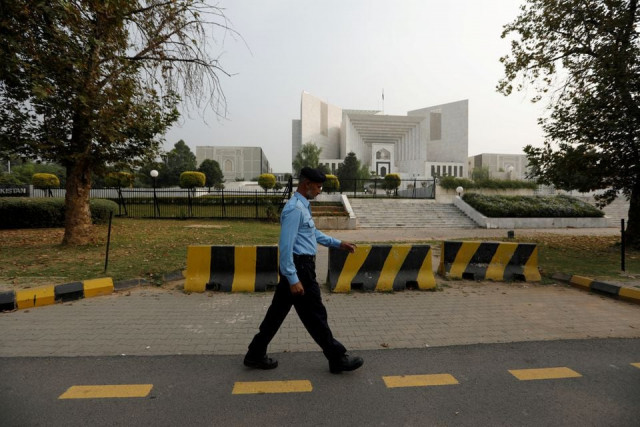Bars oppose elevation of junior judges to SC
Govt pressed to enact laws to regulate CJP’s discretionary powers to constitute benches, fix cases

Bar associations from across the country have strongly opposed the elevation of junior judges of the high courts to the Supreme Court and have pressed the government to enact laws to regulate the discretionary powers vested in the chief justice to constitute benches and fix cases.
The resolution was adopted in a joint meeting of the representatives of the Supreme Court Bar Association of Pakistan (SCBAP), high court bar associations of all the provinces, Pakistan Bar Council (PBC) and members of bar councils to the Judicial Commission of Pakistan held here at the Supreme Court building on Wednesday.
The meeting, presided over by SCBA President Ahsan Bhoon and PBC chairman of executive committee Pir Muhammad Masood Chishti, considered the situation arising out of the controversies linked to the judiciary’s independence with regard to the functioning of courts as well as the appointment of judges in the superior courts.
It unanimously resolved that the legal fraternity did not harbour any personal agenda and that it practised complete impartiality, emphasising that the lawyers wanted strict adherence to the rule of law and principle of seniority.
The meeting emphasised that the nominations for the appointment of junior judges to the apex court were in violation of the seniority principle and therefore, it was disapproved by the house.
READ PM Shehbaz stresses equal justice for everyone after SC verdict
Moreover, it reiterated its long-standing demand that the JCP immediately amend its rules to allow nominations for judicial appointments to be initiated by any member of the commission rather than the chief justice alone. It stressed the need to frame fair, transparent and objective criteria and procedures to gauge the suitability of prospective appointees.
It was demanded that amendments in Article 175-A and Article 209 of the Constitution should be made in order to unify the forum for appointment and removal of judges and to make it more inclusive and comprising equal representation of all the stakeholders (i.e. judges, bar, executive and the parliament).
Moreover, the house demanded that Article 184 (3) of the Constitution be amended in order to provide one right of appeal.
Legislation to regulate suo motu powers
Furthermore, the bar associations further demanded that the federal government immediately frame legislation in terms of Articles 175(2) and 191 of the Constitution regulating the manner of exercise of jurisdiction of the Supreme Court.
The legislation, in particular, should be aimed at ending the sole discretion of the CJP to constitute benches, fix cases and initiate suo motu proceedings and vest the same in a committee comprising the five senior-most judges of the court.
It also asked the federal government to immediately withdraw the curative review filed against the senior most judge of the Supreme Court Justice Qazi Faez Isa “as admittedly, it was wrongly filed”.
And lastly, the house resolved that the Supreme Court rules be amended to ensure that the review petitions are heard by a bench different from the original bench and allow the engagement of different counsel for the review petition.



















COMMENTS
Comments are moderated and generally will be posted if they are on-topic and not abusive.
For more information, please see our Comments FAQ